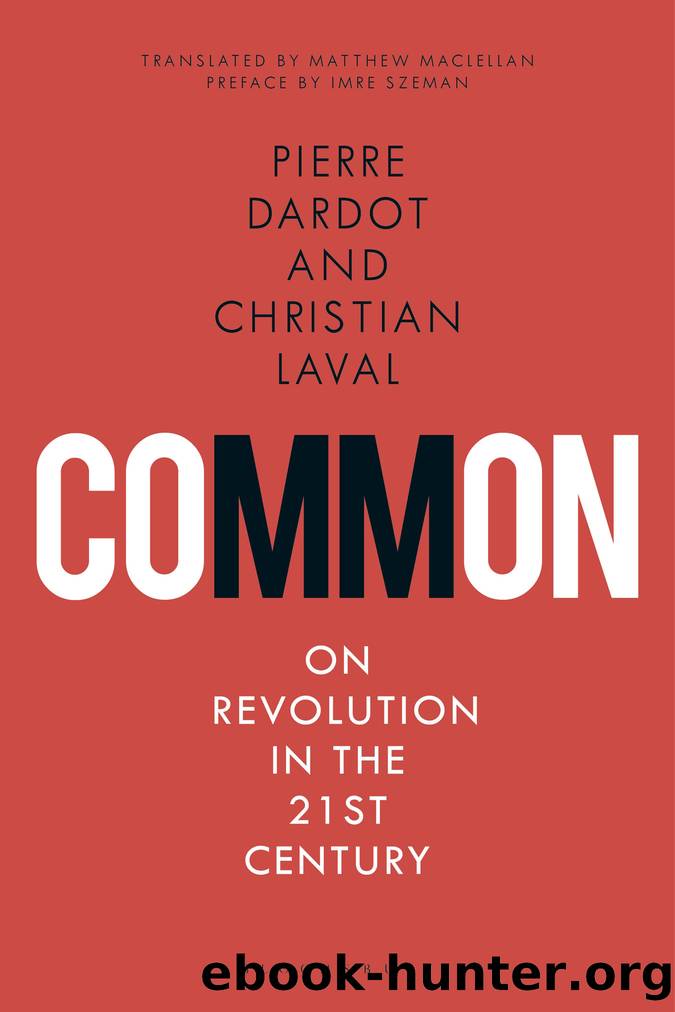Common by Pierre Dardot;Christian Laval;

Author:Pierre Dardot;Christian Laval; [Laval, Pierre Dardot and Christian]
Language: eng
Format: epub
ISBN: 9781474238625
Publisher: Bloomsbury UK
Published: 2018-11-22T00:00:00+00:00
The âCustoms of the Poorâ versus the âCustoms of the Privilegedâ
Given Marxâs emphasis on the conflict between public law and private interest, could we not simply label Marx a âgood liberal rationalistâ who denounces the mystification of a âfalsely universal and rational stateâ on behalf of this same universality?60 Is not Marxâs critique, in this case, merely a matter of opposing the true purposes of public right against its appropriation by private interest? To see why this interpretation is not tenable, we need to look at the second argumentative thread woven through these five articles on the theft-of-wood law. From the very beginning of his first article, Marx gives special consideration to the nature of custom as such, and he concludes this article with a fierce denunciation of the customs of the privileged as âcontrary to the lawâ (wider das Recht).61 Taken literally, this assertion claims that the customs of the privileged are, in fact, illegal. On the other hand, Marx âdemands for the poor a customary right [das Gewohnheitsrecht] and indeed one which is not of a local character but is a customary right of the poor in all countries.â62 In other words, Marx calls for a universal customary right of the poor.
Marxâs claim is striking in its originality, and needs to be carefully unpacked. For it is through this unusual claim that Marx endows customary right with a rather singular double determination, namely the unusual extension of a very localized social content onto a global scale. This assertion fundamentally breaks with the dominant view that such laws or customs can only be local in nature. We have already seen that custom is lex loci, while âcommon lawâ is extended to the national level, at least in England,63 and so it should not be identified with customary right. And as widespread and perennial as the customary rights of the poor were, they were far from indiscriminately codified into common law. The âartificial reasonâ of judges and lawyers was, as we have seen, extremely reluctant to endorse any customs that might discourage âimprovements.â But Marx is not satisfied with this claim alone (which is already a little confusing). âWe go still farther,â asserts Marx, âand maintain that a customary right by its very nature (seiner Natur nach) can only (nur) be the a right of this lowest, propertyless and elemental mass (dieser untersten besitzlosen und elementarischen Masse).64 We need to pay careful attention to move from one premise to the next in order to properly grasp what Marx is saying at the beginning of the second sentence. He first asserts âwe go still further,â and thereby indicates he wants to move beyond the premise âthere must be a customary right of povertyâ (as far as such a thing can be claimed), to a more ambitious proposition: âcustomary right is necessarily the customary right of the poor.â In other words, Marx is saying that there can be no other customary law other than that of the poor, because any other customary
Download
This site does not store any files on its server. We only index and link to content provided by other sites. Please contact the content providers to delete copyright contents if any and email us, we'll remove relevant links or contents immediately.
Adding Value to Policy Analysis and Advice by Claudia Scott; Karen Baehler(463)
Sociological Perspectives of Health and Illness by Constantinos N. Phellas(449)
Race and American Political Development by unknow(448)
American Government and Politics Today by Steffen W. Schmidt Mack C. Shelley Barbara A. Bardes(438)
Human and Global Security : An Exploration of Terms by Peter Stoett(430)
Control Of Oil - Hardback by Kayal(412)
Entrepreneurship Education and Training: The Issue of Effectiveness by Colette Henry Frances Hill Claire Leitch(387)
Materializing the Middle Passage by Jane Webster;(374)
Advances in Child Development and Behavior, Volume 37 by Patricia J. Bauer(368)
The Catholic Church and European State Formation, AD 1000-1500 by Jørgen Møller(360)
The World According to China by Elizabeth C. Economy(347)
Left Is Not Woke by Susan Neiman(330)
Turkey's Relations with the West and the Turkic Republics: The Rise and Fall of the Turkish Model by Idris Bal(323)
Theories of Counseling and Psychotherapy: A Case Approach by Nancy L. Murdock(320)
Cross-Cultural Child Development for Social Workers by Lena Robinson(316)
Japan's Ainu Minority in Tokyo by Mark K. Watson(302)
Laboratory Life by Bruno Latour(297)
Beyond Service: State Workers, Public Policy, and the Prospects for Democratic Administration by Greg McElligott(289)
The Oxford Handbook of Museum Archaeology by Stevenson Alice;(280)
